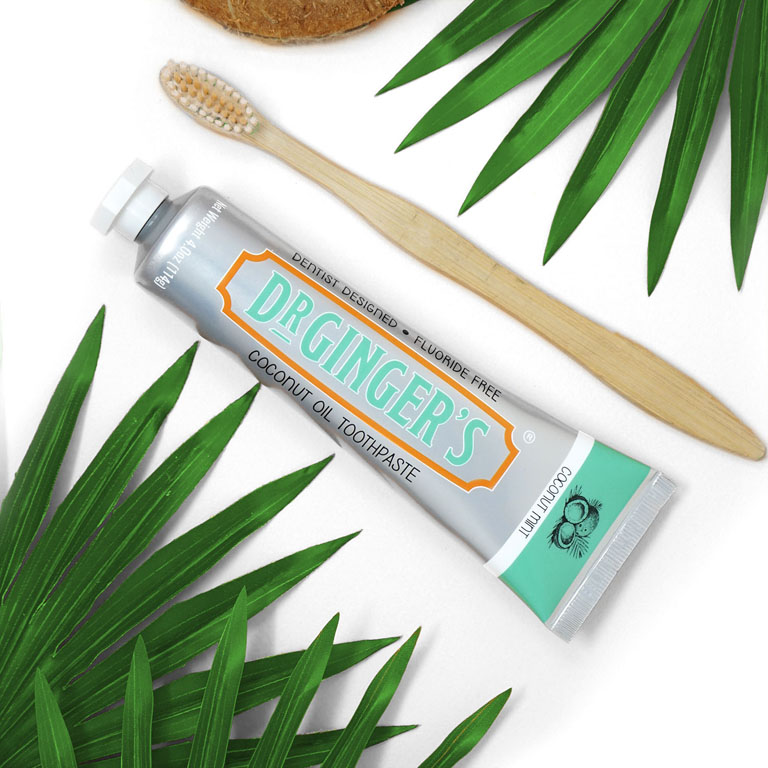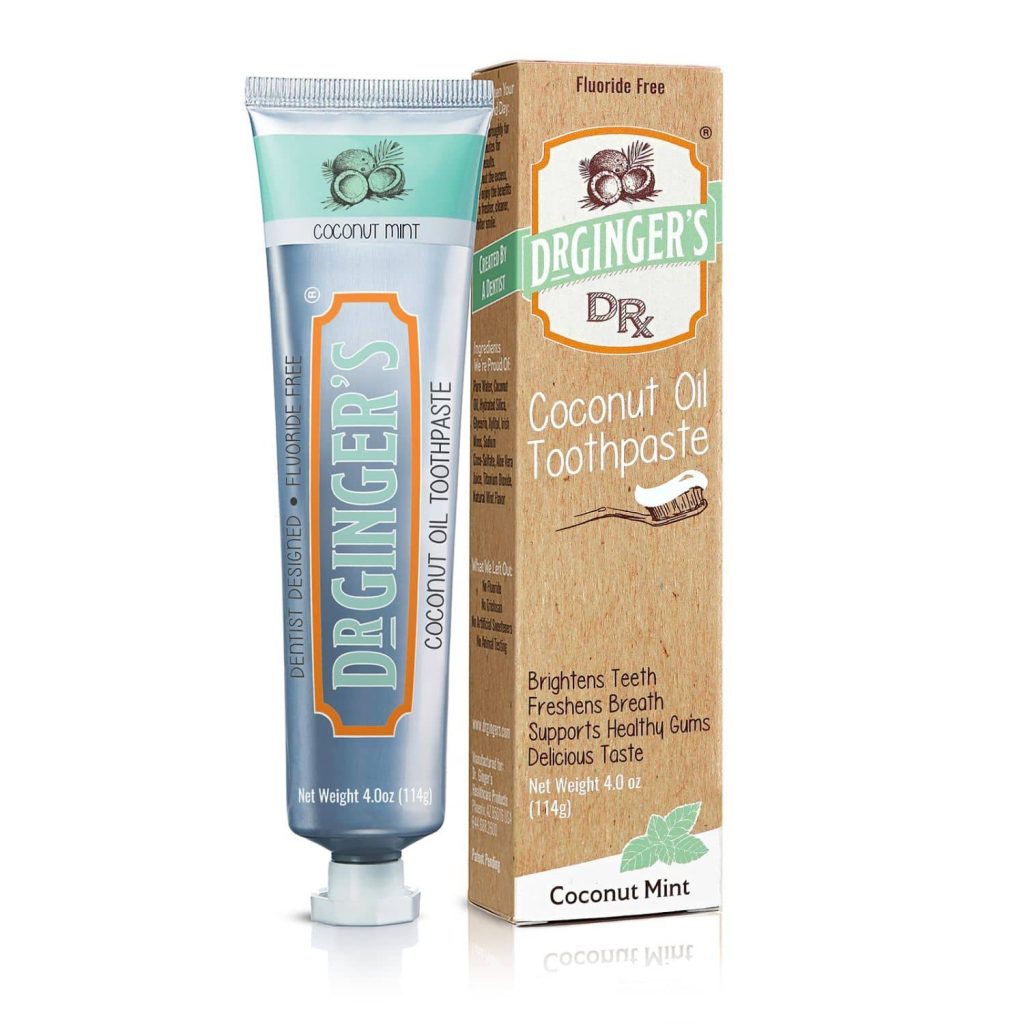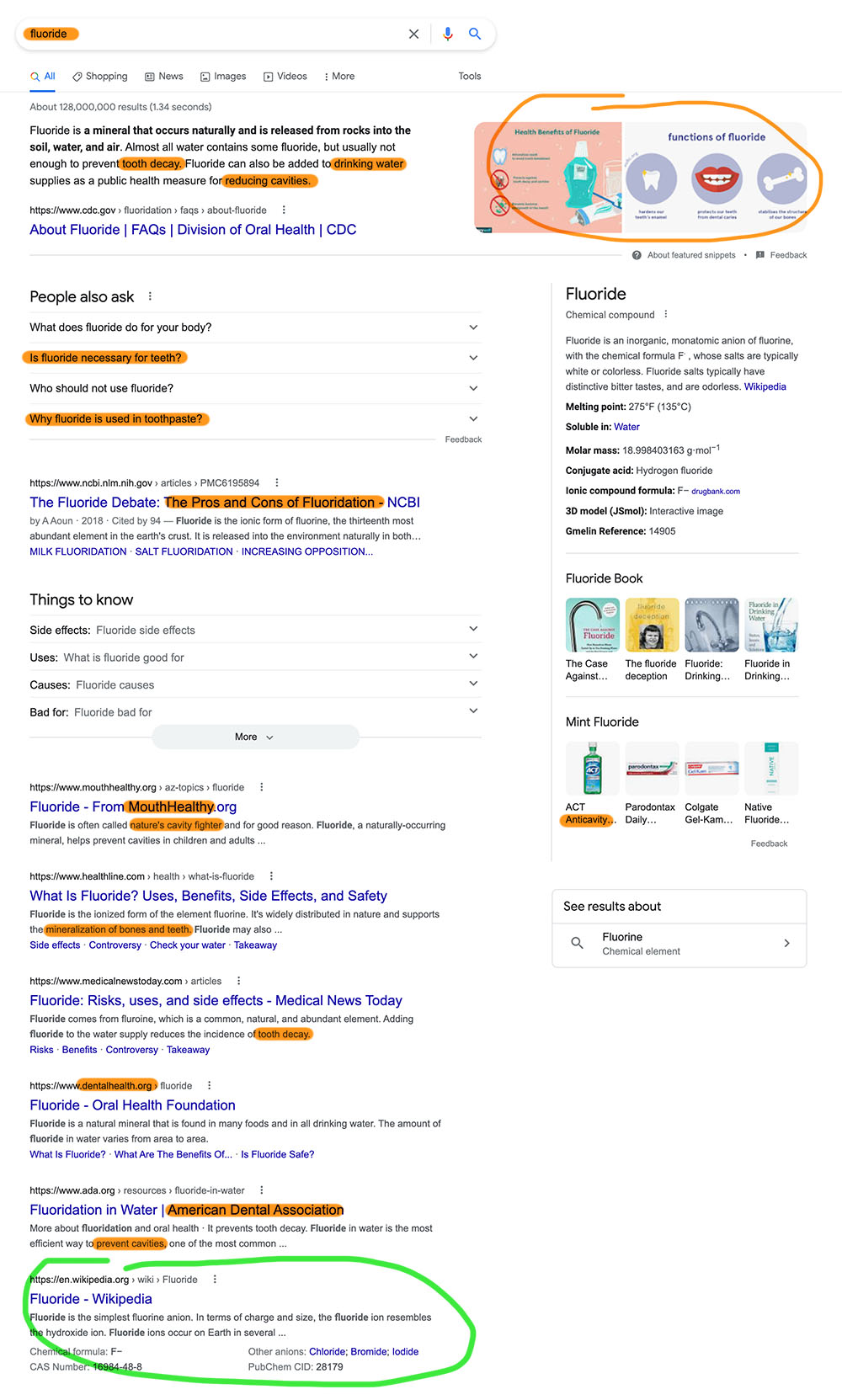In This Article


Winner! Dr. Ginger's Coconut Oil Toothpaste
- Contains Coconut Oil to Reduce Plaque
- Contains Xylitol to Help Tooth Enamel
- Protects Gums & Teeth from Bad Bacteria
- Perfect For Sensitive Teeth
- Designed By A Dentist
What Makes Dr. Ginger’s Coconut Oil Toothpaste the Best Fluoride-Free Toothpaste for Sensitive Teeth?
Besides the great taste and fresh feeling mouth when you're done using it? The secret lies in the organic coconut oil and Xylitol blend that was developed by 35+ year dentist, Dr. Ginger Price, DDS.
It approaches sensitive teeth from a different angle than the conventional (treatment) angle, and it does so with great ingredients that we all know and trust.
Organic Coconut Oil: Which comes from organically grown and harvested coconuts.
Xylitol: Which is a naturally occurring sugar alcohol found in plants, fruits, and vegetables and is often derived from Xylitol rich sources like corn or birch.
The blend works well for sensitive teeth (and all teeth) because coconut oil + Xylitol work together to support healthy gums and teeth in general. Here are some research results on the ingredients themselves:
- Coconut Oil: Significantly reduces Streptococcus mutans---the main contributing bacteria that leads to plaque build-up and tooth decay.
- Xylitol: Assists in remineralization of the tooth enamel, and is non-fermentable by plaque organisms---meaning plaque organisms cannot eat/digest Xylitol and turn it into acidic waste.
In plain speak: The Coconut Oil + Xylitol combo stops bad bacteria from harming the tooth, while assisting in a healthier oral environment (which allows the natural processes of a healthy mouth to occur---like remineralization of the teeth, maintaining of gum line, etc.).
And when it comes to sensitivity from receding gum lines, well... A 68 year-old Dr. Ginger's customer claims his dentist marked improved gum lines after using coconut oil mouthwash and coconut oil toothpaste for 6 months. So there's that.
The Current Conventional Approach to Sensitive Teeth.
The current conventional approach to sensitive teeth uses manmade ingredients like chlorhexidine and potassium nitrate to reduce plaque and temporarily reduce nerve sensitivity in teeth.
Why is this considered a "conventional" approach?
The mechanism of action, disinfecting the mouth of bacteria and numbing the nerve endings in the tooth, is being handled by chemicals interacting directly with the bacteria and with the sensitive nerve endings in a way that would not happen in nature. The chemicals and approach are manmade, and are designed to provide relief to a problem that exists (and is not necessarily designed to solve the problem itself).
We're not claiming this is right or wrong (relief is important). It's just the way our collective oral health is right now.
So Why Use a Non-conventional Toothpaste for Sensitive Teeth?
This comes down to a personal choice. Both conventional and non-conventional oral care products have shown to be effective in reducing plaque and gingivitis...but that's not always the point, is it?
The thousands of consumers switching to non-conventional (some say "natural") oral care products seem to agree upon this wisdom: If nature has a solution, why use a manmade one?
For example, if nature has a solution to plaque, gingivitis, and tooth sensitivity via supporting a healthy oral environment using coconuts and Xylitol, then why use a manmade solution that only provides short term relief?
And in this case, Dr. Ginger's Coconut Oil Toothpaste utilizes uses a scientifically backed coconut oil + Xylitol combo for cleaning and supporting healthy teeth and gums as opposed to additives like fluoride, chlorhexidine, and potassium nitrate.
Chances are, just taking a peek at chlorhexidine and potassium nitrate will have you wondering what they're doing in products we consume.
Why Take a “Fluoride-Free Toothpaste” Approach to Sensitive Teeth?
Consumers are switching to fluoride-free toothpaste for sensitive teeth (and more natural products for oral care in general) for basically the same health reasons that have them wary of conventional toothpaste: fluoride rings the same "is this really a necessary chemical additive" alarm bell.
To understand further, let's take a quick dive into the topic of fluoride. After all, being a dentist for 35+ years Dr. Ginger knows a thing or two about fluoride vs fluoride-free oral care.
First: What is Fluoride?
It's a basic element found in the earth's crust, trace amounts in water (from natural sources), and in the biosphere, according to Wikipedia. It often presents itself as a salt in nature, and it is an important reagent (additive to cause a chemical reaction) in industrial chemicals.
Second: Why is It Talked About in Oral Care?
It's commonly added to toothpaste and mouthwash with the goal of strengthening the tooth's enamel (the hard outer surface of the tooth).
Small Detour: Fluoride Is Deeply Connected to the Public’s Oral Care Concerns.
Don't use fluoride for this, do use fluoride for that. It's in toothpaste, it's in rinses, it's in the water supply in many major cities across several countries. There are tons of articles explaining what fluoride is, what it isn't, what it does, what it doesn't do, how it does it, and so on (and it's usually pretty polarizing).
Take for example, try looking up the word "fluoride" on Google. One could reasonably expect to get content about the element itself, right? However, we see mostly articles about oral care, and why you should or shouldn't use it.

Only at the very bottom of the results page do we find information about the element---on Wikipedia. And even then, the Wiki page immediately tells the reader that the article is not about fluoride in toothpaste.

Clearly, this is a buzz-worthy topic.
Third: What Does Dr. Ginger Think about Fluoride?
In Dr. Ginger's words:
"Here's the thing: we know fluoride hardens the tooth. There's no doubt about this topic in the field of dentistry. However, there are many sources of fluoride already in our diets and that has people concerned about consuming too much fluoride, and its side effects. Especially when it's in water, toothpaste, and mouthwash---things we use daily.
Children under 6 shouldn't be consuming fluoride due to concerns about tooth health and fluorosis, and as we grow into adults, fluoride is still toxic in high enough doses.
There's plenty enough reason to be concerned about fluoride intake levels, and even if you dismiss that concern, there are other ways to provide comparable care that fluoride provides, without the fluoride!"
-Dr. Ginger Price, DDS

(If you want to read a great educational article about the pros and cons of fluoride in water, toothpaste, consumer salt, etc., this is a good one on PubMed.)
Finally: Why Take a “Fluoride-Free Toothpaste” Approach to Sensitive Teeth?
Let's go ahead and pull the above quote from Dr. Ginger:
"...there are other ways to provide comparable care that fluoride provides, without the fluoride!"
Dr. Ginger Price, DDS
Here's the approach taken at Dr. Ginger's (the company):
If there is a large gray area surrounding fluoride and its overall impact, and there are alternative ways to provide similar benefits to oral health using natural ingredients that don't have the same negative stigmas or concerns, and the market wants it...why not make a product that answers that need?
How Did Dr. Ginger Get Fluoride-Free Oral Care So Right?
Dr. Ginger Price, DDS had been receiving a number of inquiries from her patients about using coconut oil in their routines. Having spent decades dealing with all sorts of different mouths from different people with different cultures and different diets, Dr. Ginger was uniquely aware of the benefits of coconut oil for everyone. She'd seen it, measured it, and had been amazed by it first hand.
As she looked into the marketplace to suggest products to her patients, she couldn't find anything she liked, so she decided to fill the void herself.
When it came to finding the best sources to develop a non-conventional toothpaste for sensitive teeth, the question wasn't just where to look, but also when. At least, this is the approach that Dr. Ginger took when designing her (now renown) Coconut Oil Toothpaste.
Dr. Ginger pored through research articles, fellow dentists, formula specialists, and so on, and found coconut oil and Xylitol to be more and more intriguing as she went.
The use of coconut oil and Xylitol in a wide variety of products extends waaaaay back to both ancient Egyptians and ancient Indians. These cultures had used coconut oil for toothpastes, lotions, hair care, food, rituals, and more.
She experimented with coconut oil pulling herself, and marveled at the benefits.
But the real innovation came when she decided that 20 minutes of swishing coconut oil around the mouth was just far too long for the average consumer.
So with her years of experience in dentistry, background in science, and a realization that there could be better alternative choices for oral care in the market, she set out to make the perfect toothpaste.
And fortunately for us all, she succeeded.
The Conclusion
When it comes to finding the best oral care toothpaste for sensitive teeth, look no further that Dr. Ginger's Coconut Oil Toothpaste (and Dr. Ginger's entire line-up of oral care products).
Its delicious combination of organic coconut oil and Xylitol work to provide a healthy oral environment.
When used in tandem with a coconut oil and Xylitol mouthwash, like Dr. Ginger's Coconut Oil Mouthwash, the positive effects to your oral health become substantial.